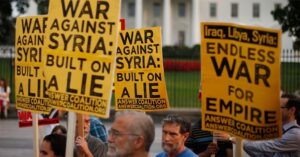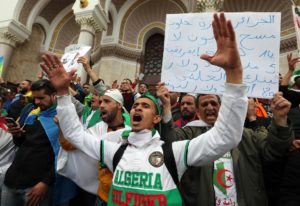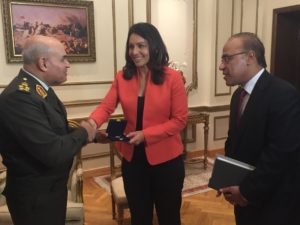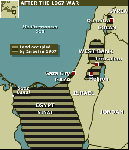
The purpose of the teenage anti-imperialist is to take a precise position at a certain moment in time for a mostly-domestic, aesthetic purpose.

The purpose of the teenage anti-imperialist is to take a precise position at a certain moment in time for a mostly-domestic, aesthetic purpose.

What faces us in the post-COVID-19 world as we struggle to uproot capitalism and its malignant racism, sexism, heterosexism, and environmental destruction, both in theory and in practice?

What sparked these latest uprisings, and what has made them so successful thus far? What are the balance of forces today in Algeria and Sudan? And what has changed since 2011 that may allow for a different outcome than the bleak reality we have seen across the Middle East for the past six years?

Tulsi Gabbard is getting a pass from people who should know better, first from Glenn Greenwald and then from the folks at Democracy Now! They describe her as “progressive except that some leftists on some issues . . .

The #MeToo movement against sexual assault and rape has animated women throughout the world. In the Middle East too, despite the wars led by authoritarian states, various imperialist powers, and extremist religious fundamentalist forces, a #MeToo movement is rising. How . . .

JUNE 2017 IS THE FIFTIETH ANNIVERSARY of the 1967 Middle East War—the June War or, as Israelis like to call it, the Six Day War.
Why should we care today about this historical event? For one, the war—with its resulting conquests, refugees, and shifting alliances—helped define the modern Middle East and make it one of the world’s great flash points for further conflict. But there are other reasons as well why this war bears re-examination.
As I write, a horrible tragedy is unfolding in Egypt. The old order has reasserted itself with a vengeance. Nevertheless, it is hard to imagine that Egypt will ever again be what it was before 2011.
The following statement from the Egyptian Revolutionary Socialists makes a powerful case for socialism from below in the context of the Egyptian coup, the massacres carried out by the military and their horrific impact on the nation's democratic upsurge. Like others, the Revolutionary Socialists is evolving its point of view, challenged as it is with understanding first the election of a repressive right-wing Muslim government on the heels of a healthy mass movement, and then the shocks from a bloody military coup. We think it important to share their statement on the situation and, along with the Campaign for Peace and Democracy and others, we are republishing it as a contribution to the general discussion.
The bloody dissolution of the sit-ins in Al-Nahda Square and Raba'a al-Adawiyya is nothing but a massacre—prepared in advance. It aims to liquidate the Muslim Brotherhood. But, it is also part of a plan to liquidate the Egyptian Revolution and restore the military-police state of the Mubarak regime.
[from Weekly Worker 969, July 4 2013]
The great Syrian poet, Nizar Qabbani (1923-1998) more than four decades ago called on a new Arab generation to break with their dictatorial, bankrupt, and corrupt leaders and their supporters. Qabbani, from his London exile, hoped that young people would transform the Arab world into a new free and vibrant society where citizens could develop their full potential and flourish.
(Editor's note: Ali Kadri, presently a visiting fellow at the London School of Economics (LSE), has written this letter, received by a member of the New Politics Editorial Board.)
The Campaign for Peace and Democracy issued the statement below about the democratic revolution in Egypt.
Statement by the Campaign for Peace and Democracy
February 14, 2011
Stuart Schaar has written an especially astute analysis of events in Tunisia and beyond. His article was published on February 6 in Mumbai, India by the Economic and Political Weekly. Schaar is the co-author of THE MIDDLE EAST AND ISLAMIC WORLD READER. He is professor emeritus of Brooklyn College and is now living in Morocco.
Mazin Qumsiyeh writes about Israel and the Middle East. What distinguishes his writing is his fusion of sharp political critique and acknowledgment of our common humanity. His most recent commentary, on events in Egypt, contains valuable information and links, as well as his typically thoughtful, moving analysis.
We are writing to extend our heartfelt solidarity and support to you, Egyptian workers, who in recent months have been courageously demanding that your government address your desperate economic conditions. The American press has been shamefully muted about the grim economic and political realities of life for people in Egypt, a key strategic U.S. ally in the Middle East.